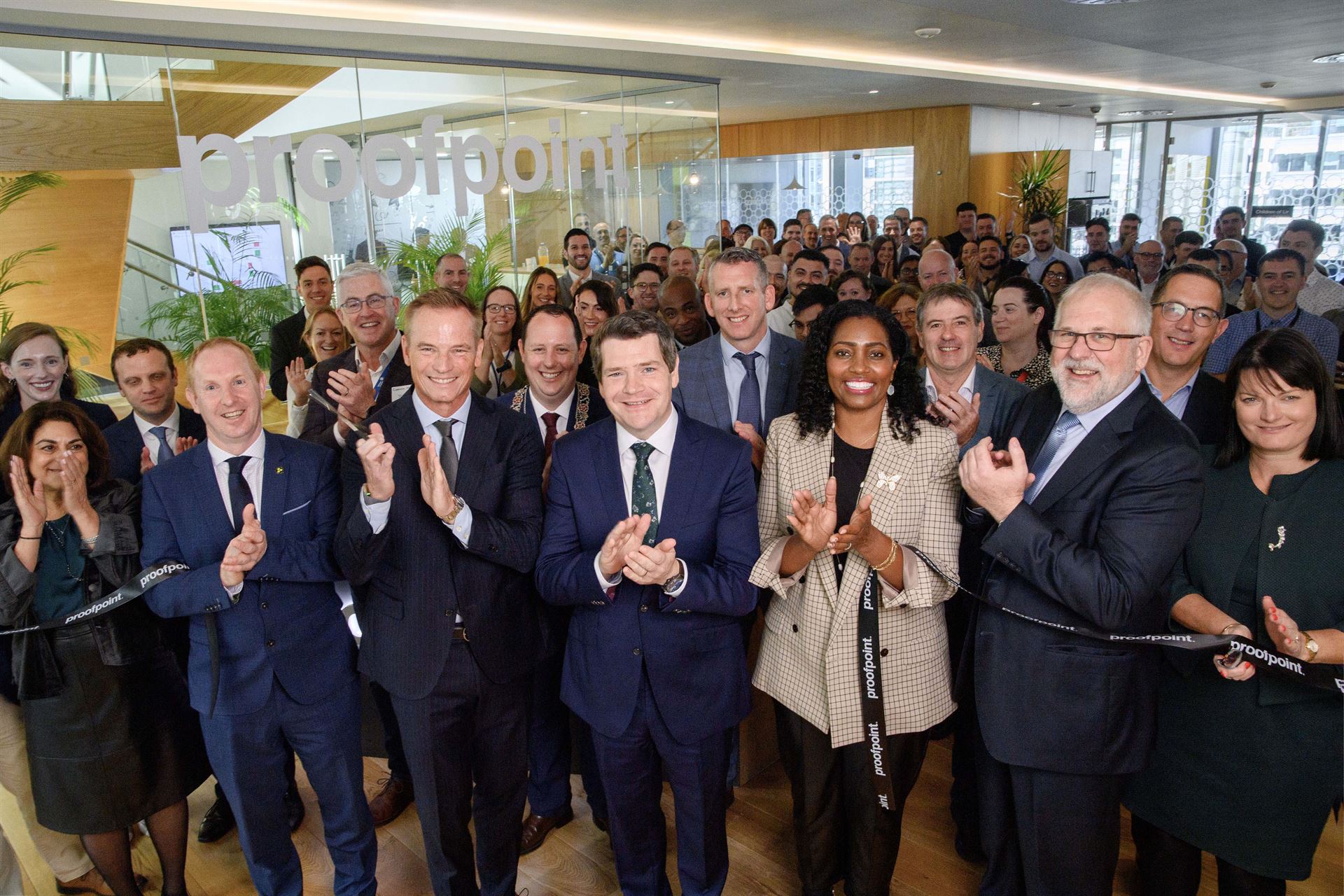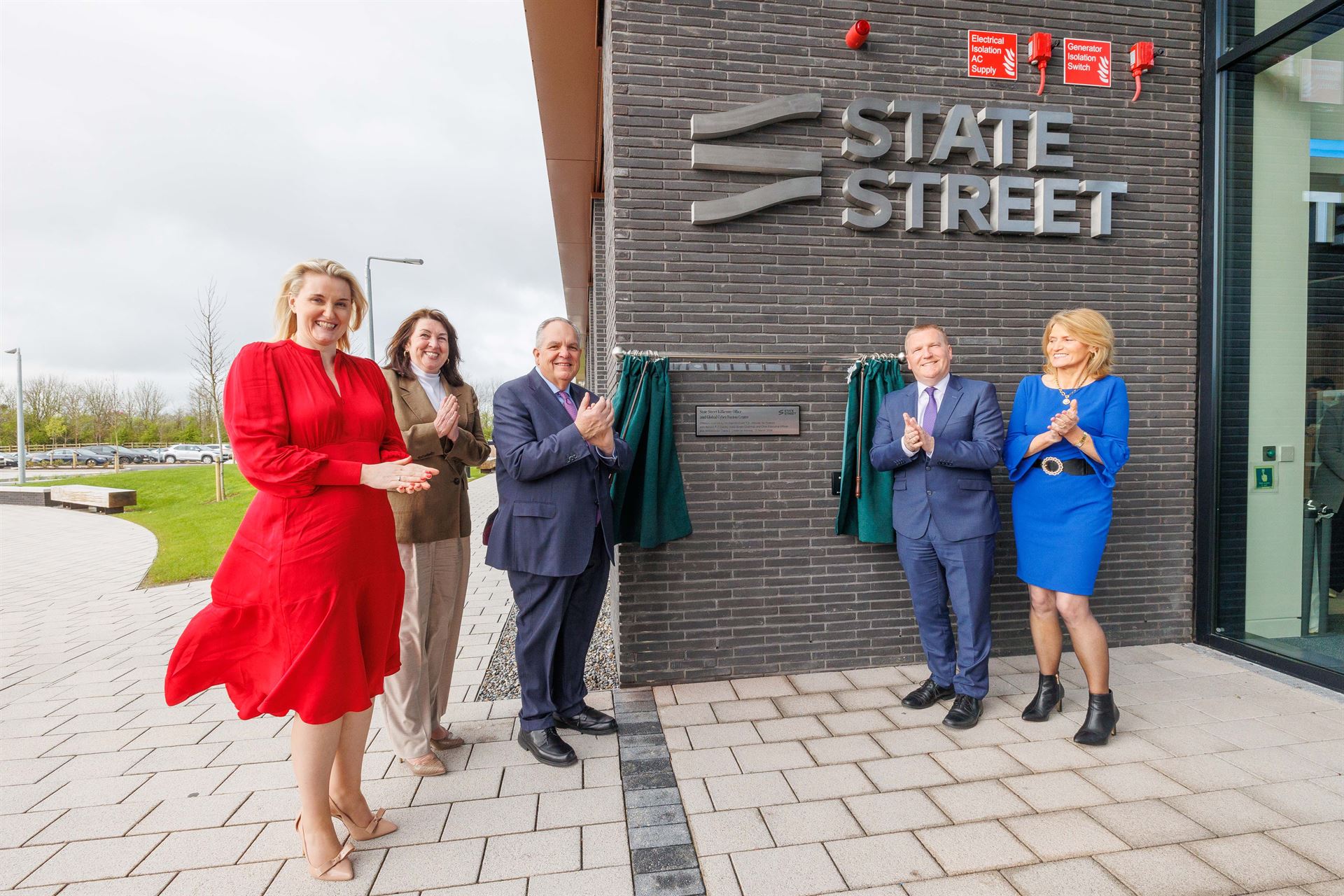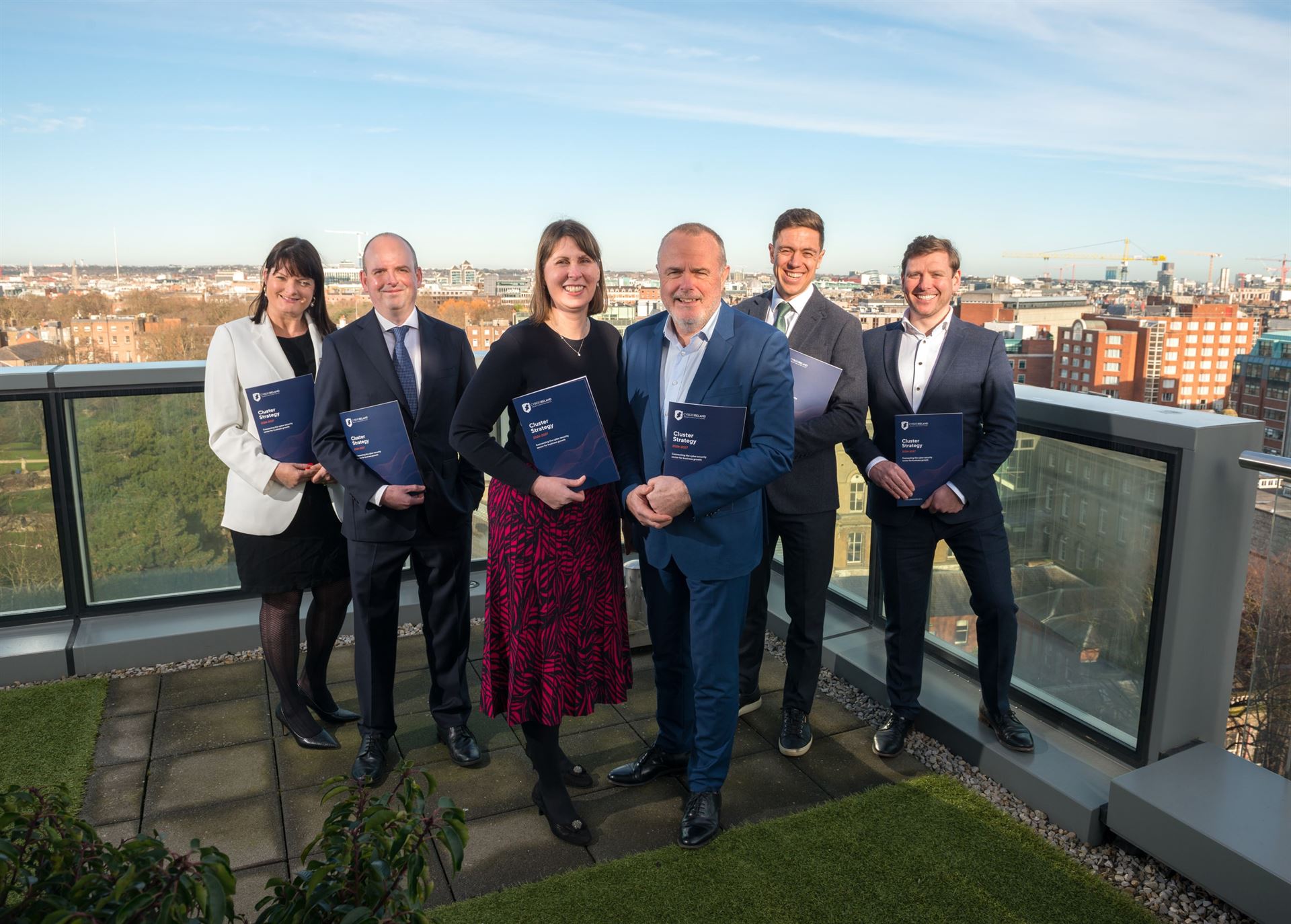Growing demand for cybersecurity services is creating an increased need for skills, and this is where Ireland plays a leading role. In Ireland, companies can tap into talent that’s ready made for what the industry needs. Today, six of the top 10 global cybersecurity companies have a base of operations in Ireland, and the sector employs 7,000 people across the country.
A track record in attracting major names
Some of the cybersecurity companies with operations in Ireland are familiar names like Check Point, CrowdStrike, Eset, Fortinet, Mandiant, McAfee, Proofpoint, Symantec (now part of Broadcom), Trellix and Trend Micro; others are mainstream technology businesses with cybersecurity functions in Ireland, including AWS, Microsoft, and Hewlett Packard Enterprise.In September 2024, Proofpoint chose Cork as its new international hub, creating more than 250 jobs by 2026 with plans for active recruitment and ongoing investment there. “We are excited to be able to tap into Ireland’s strong technology ecosystem, with its broad cybersecurity talent base,” said Kim Sullivan, the company’s chief people officer.

Cybersecurity sector’s strong roots in Ireland
One of the longest established of the cybersecurity multinationals in Ireland is Trend Micro and in many ways, its story reflects the security industry’s expansion in Ireland over the past two decades. Robert McArdle first stepped through the doors at the company’s Cork office back in 2007. Now he is director of its forward-looking research team and he reflects on how much has changed.Another more recent arrival is eSentire, which achieved ‘unicorn’ status of $1billion-plus valuation in 2022 – a fact which shows the growing market need for cybersecurity. The Canadian company has had an operation in Cork since 2015.“From a time where you knew everyone in the building – to the 270-plus people currently located here, and our numerous visitors from other regions showing up on a weekly basis – Cork has placed itself firmly on the map as the headquarters for Trend Micro operations in the Europe region, and continues to expand in terms of people and functions that we serve here,” McArdle says.
Education partnerships drive talent development
Ciaran Luttrell, site lead and senior director at the company’s Cork centre, says the third-level education system’s industry-focused courses produce the skills the company needs. “eSentire has several very, very strong partnerships, and I emphasise the word ‘partnership’. A good example is Munster Technological University: they have what I would describe as the leading programme in cybersecurity in Ireland, hands down,” he says.The activity in Ireland goes beyond pure-play cybersecurity companies, and it’s not just limited to cities like Cork and Dublin. A growing trend has seen financial services companies locate cybersecurity teams in Ireland. In 2011, JRI America Inc, the dedicated IT subsidiary for Sumitomo Mitsui Banking Corporation (SMBC), set up in Tralee, County Kerry, and has steadily grown the overall technology team to over 250 employees, with 50 of those operating within the security function.
Security roles are spread across a variety of domains including cyber monitoring and incident response, threat intelligence, digital forensics, vulnerability management, security automation, threat detection engineering, identity and access management, information security awareness training, and governance, risk and compliance.
It also makes sense logistically to have a large multidisciplinary team housed in one location like Tralee, says Shane Walsh, country head of JRI America. “You get more clarity more quickly, working together.”

Financial firms bank on Ireland for cyber talent
“What we needed when we first came to Ireland was a talent pipeline and it seemed logical to be on campus with the Munster Technological University, so we’re located in Kerry Technology Park. That access to the university sector was a key selling point for us,” Walsh adds.JRI America takes a blended approach to hiring, by recruiting a combination of graduates from masters programmes in cybersecurity and people with degrees in more general technology disciplines like software development, who can then upskill with industry-leading credentials within the business.
Strategic sites drive collaboration
Damien Moran, head of the security operations centre adds: “The approach we’ve taken is, it’s far more than a traditional security operations centre (SOC), essentially, it’s a fusion centre. Our threat intelligence team sits within the centre and when we’re monitoring, we can call on those resources. In the midst of any zero-day vulnerability or having to respond to an incident, we really can look at all aspects of security and can have representatives of each function go into a meeting room. That kind of collaboration is great and eliminates a lot of silos.”Another financial services company, State Street, has had dedicated cybersecurity staff in Ireland for many years. Recently it made a significant investment in Ireland as these functions grew, diversified and moved to an entirely in-house model, culminating in the establishment of a Cyber Fusion Centre that opened in 2024. The company is currently nearing 150 professionals at its site in Kilkenny and expects this number to grow in the coming years.JRI America’s Irish site dovetails with a second centre in Tokyo, while other key members are based across the Americas also and in the Europe, Middle East and Africa region. “We would be seen as a centre of gravity, in a way, for security operations,” Moran says.

Ireland’s blueprint for other global sites
The team in Kilkenny provides non-stop services to all of the company’s business units in Asia Pacific, EMEA and Americas time zones. All core cybersecurity team functions take place in Kilkenny, including security operations roles such as threat intelligence, threat hunters, vulnerability management, and cyber defence, as well as security engineering, cloud security, and data science functions. Some functions are co-located in Dublin.Terri Dempsey, country head for State Street in Ireland, says access to and the availability of highly motivated technical talent in the South-East region was a driving factor in choosing the Kilkenny site.
“There is a deep technical base in Ireland, and with many multinationals having global functions anchored here, we have been able to attract seasoned and experienced professionals to State Street. The national network of technical colleges and universities in Ireland that have strong cybersecurity curriculums ensure we can access a rich pipeline of graduate and early career talent,” Dempsey says.
These Irish-based cybersecurity centres are far more than just satellite operations: the Kilkenny site wasn’t just State Street's first cybersecurity hub outside of the United States, it’s also the first Cyber Fusion Centre built by the firm anywhere in the world.“This is a dedicated multidisciplinary centre of expertise where all cyber functions are co-located in a highly collaborative setting to maximise teamwork and innovation,” Dempsey explains. This blueprint is now being replicated in Boston, Massachusetts where the firm will shortly open its second Cyber Fusion Centre.
Dempsey describes the attributes that make Ireland a compelling destination for cybersecurity centres. “Ireland has a geographic location that is suitable for supporting our Global business, with excellent stability from a geopolitical perspective and reliable infrastructure. When you add the progressive and sustained assistance from the Irish Government combined with access to a rich talent marketplace, it all resulted in a compelling case to invest in Ireland,” she says.
Laying the groundwork for cyber talent
These kinds of significant investments by businesses beyond the pure-play cybersecurity sector has been possible thanks to careful curation of undergraduate and postgraduate courses, along with diplomas, micro-credentials and short courses that produce skills the industry needs. Today, higher education providers across Ireland, from Donegal in the northwest to Cork in the South, and from Shannon in the midwest to Dublin in the east, provide a range of courses covering many cybersecurity disciplines.Munster Technological University (MTU) has played a key role in laying the ground for a time when these cybersecurity skills would be in demand. Over the past 20 years, it evolved from offering a single module in cybersecurity to developing a master’s degree in network security, which in turn created a pipeline of highly skilled graduates.
MTU has received significant funding to support its work, including €9.1 million for the Cyber Skills initiative from the Higher Education Authority (HEA) and €7 million for Cyber Innovate from Enterprise Ireland (EI) Innovators Initiative, both designed to address the critical shortage of cybersecurity professionals.

Cyber Skills programme offers pathways into the profession
Cyber Skills is a collaboration between MTU, the University of Limerick, Technological University Dublin, which offers specialised, innovative programmes, pathways and micro-credentials to help people enhance their careers in cybersecurity and to grow the pool of talent available to the organisations and businesses that need it. Mastercard and Dell are among the companies that have already availed of the programme.Academic institutions normally compete for students, but they also collaborate at a research level, according to Dr Donna O’Shea, chair of cybersecurity at MTU. Each brings their own specialised areas of expertise and deep technical insight. Their knowledge covers a wide range of industry sectors. “We’re all driven by responding to industry needs and making a societal impact. That’s our primary motivating factor. We want to grow Ireland, Inc, and support indigenous cyber security capabilities,” Dr O’Shea says.
The industry’s response to the Cyber Skills initiative has been overwhelmingly positive, says Dr O’Shea. “We deal with foreign direct investment clients all the time who will be thinking about locating in Ireland. They tell us that this collaboration does not exist in other countries, or that the level of maturity around developing the different pillars of education, public engagement and digital infrastructure doesn’t exist. So when they come to Ireland and see this, they’re hugely impressed,” she adds.Collaboration doesn’t stop at Ireland’s shore: MTU also works in partnership with Virginia Tech and with Rochester Institute of Technology in the USA, where they share international best practice.
Ireland doesn’t just provide cybersecurity skills for the private and public sectors; for years, University College Dublin’s Centre for Cybercrime Investigation has trained police forces across Europe in techniques for investigating digitally enabled crime.
A vision for Ireland’s cyber future

Cyber Ireland is the national cluster that connects the cybersecurity ecosystem in Ireland. It was set up in 2019 to support the sector’s growth and address key challenges for the sector, including skills development, collaboration and outreach between industry and government.
The group’s members span Irish small and medium enterprises and startups, multinationals either working directly in the industry or providing cybersecurity services, along with universities and education training providers, along with government agencies and non-profits. “We’re bringing all these organisations together under one umbrella organisation with a strategic direction and a vision to make Ireland the leader in Europe for cybersecurity,” Byrne adds.“We’ve developed this really strong talent hub in Europe and internationally for cybersecurity. And because there's a worldwide shortage of cybersecurity professionals, companies are looking to locate wherever they can get the right talent for the most competitive costs as well,” says Eoin Byrne, cluster manager for Cyber Ireland.
In a recent report, Cyber Ireland forecast that the workforce in Ireland has the potential to add a further 10,000 jobs by 2030.
Like all technology disciplines, cybersecurity seldom stands still for long. Centres like MTU are already preparing for artificial intelligence, consulting with industry partners to understand how the skills they need will adapt to the changing landscape. What won’t change is this: Ireland will be ready.
